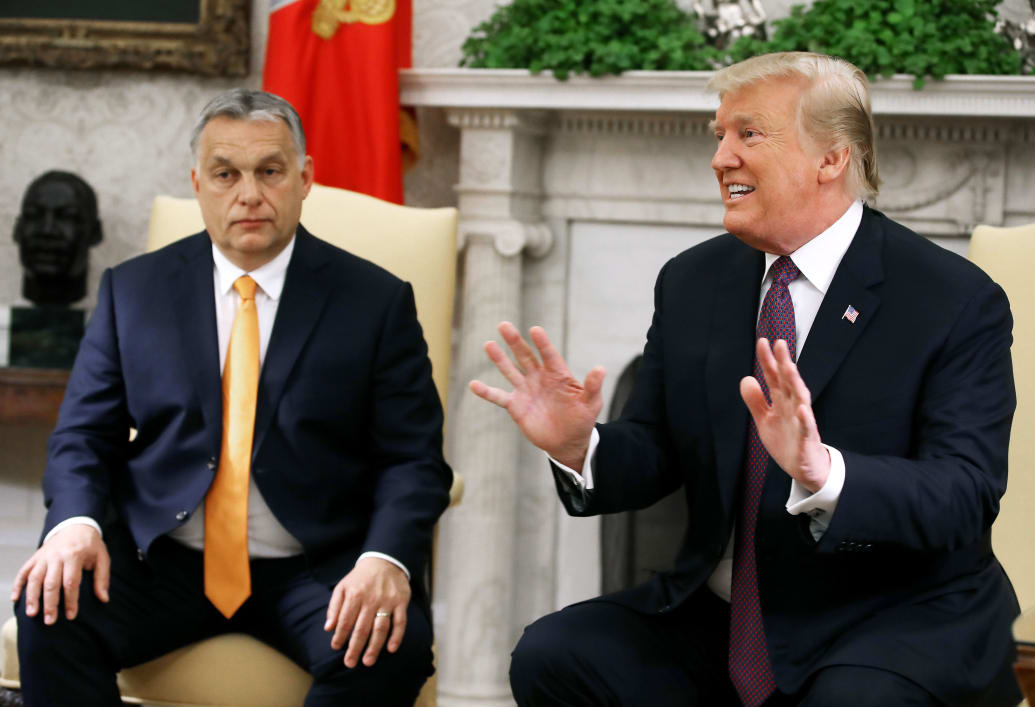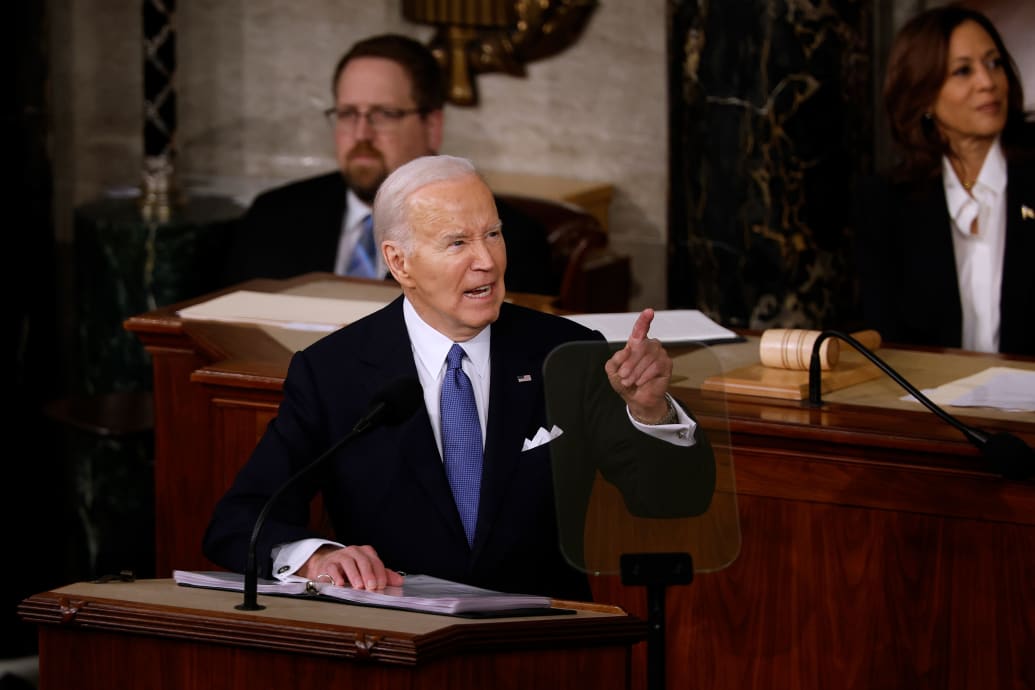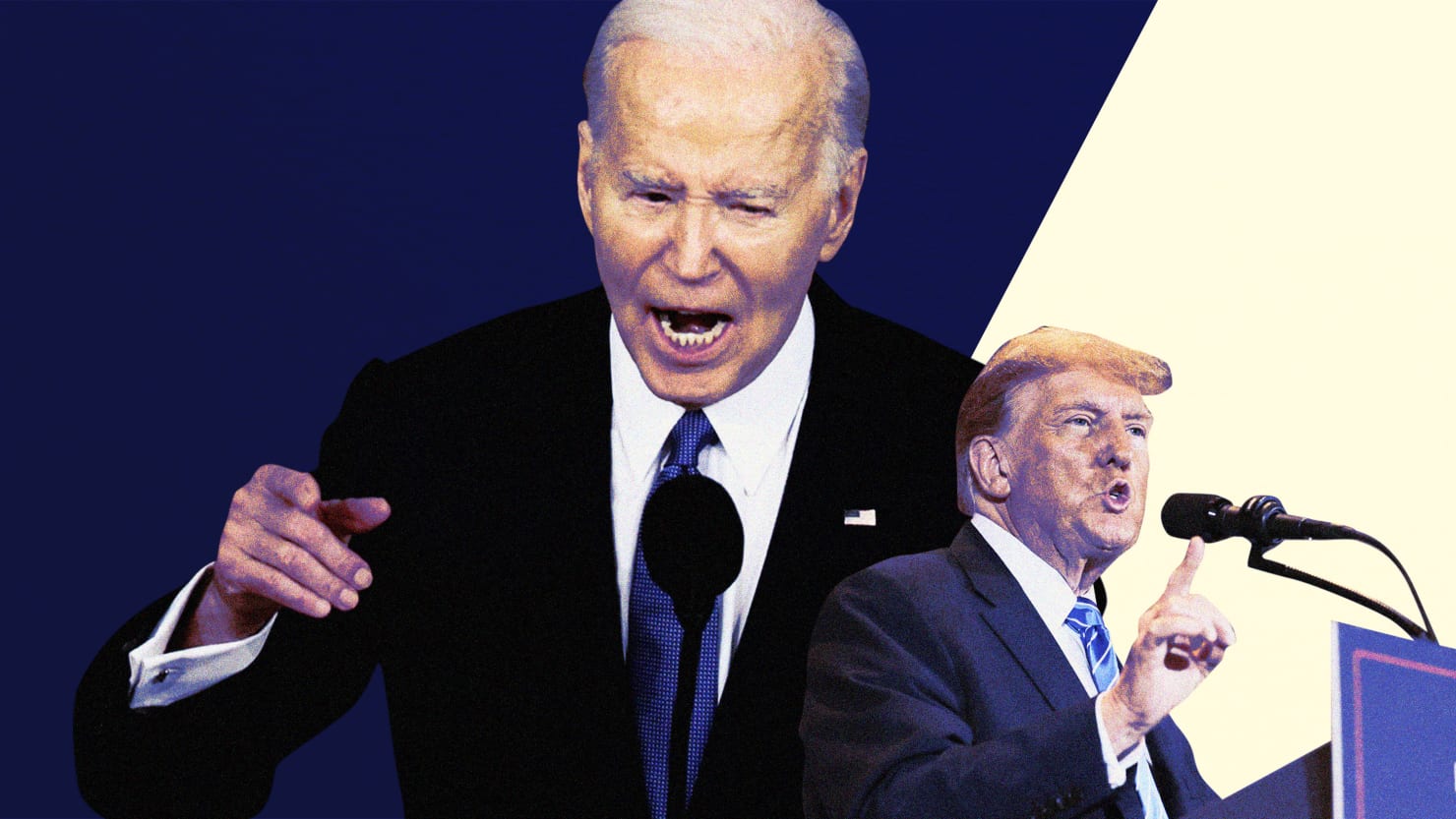Within a 24-hour period, the 2024 presidential campaign kicked off in a way that could not present the choice before the American public more starkly.
Joe Biden stood before the Congress and, in his State of the Union address, made a powerful case that he would fight with every fiber of his being to preserve American democracy and the fundamental freedoms of all Americans.
Then, late Friday, Donald Trump hosted Hungary’s authoritarian ruler, Viktor Orban, in the kind of pro-Putin, anti-democracy summit that perfectly captured the true nature of today’s MAGA Republican Party. The dinner reception was so important that even Melania Trump made one of her rare appearances at her husband’s side. Trump said, “There’s nobody smarter or a better leader than Viktor Orban. He’s the boss. He’s a non-controversial figure because he says, ‘This is the way it’s going to be and that’s the end of it.’ He’s the boss. He’s a great leader.”
A day earlier, Orban—Vladimir Putin’s man in Europe, his acolyte and champion—met behind closed doors with the leaders of the new American right at the Heritage Foundation.
There it is, America. Biden is running to preserve America’s traditional values and institutions. Trump and the GOP have openly embraced autocracy, celebrating the virtues of “strong man” government.
That sounds like hyperbole. It sounds like hysteria. It sounds like scare tactics. But it is none of those things and the sooner Americans realize it, the sooner they’ll understand the gravity of the threat we face in this election.
Biden’s State of the Union began by evoking the peril with which the U.S. was confronted in 1941, and he quoted Franklin Roosevelt’s SOTU of that year, saying, “I address you at a moment unprecedented in the history of the Union.”
“Hitler was on the march. War was raging in Europe,” intoned Biden.
Of all the points in our history, of all the threats we faced, of all the evils with which we were ever confronted, the president chose the very worst for this analogy with the current moment. It was as bold a rhetorical choice as it was an appropriate one.
He then went on to say, “President Roosevelt’s purpose was to wake up the Congress and alert the American people that this was no ordinary moment. Freedom and democracy were under assault in the world… My purpose tonight is to both wake up this Congress and alert the American people that this is no ordinary moment either.”

Then-President Donald Trump and Hungarian Prime Minister Viktor Orban, in the Oval Office on May 13, 2019.
Mark Wilson/Getty Images
There have already been oceans of pundit verbiage devoted to analyzing every nuance of Biden’s stirring address. But this first moment is what will resonate in history.
Notably, it included the assertion, “What makes this moment rare is that freedom and democracy are under attack, both at home and overseas, at the very same time. Overseas, Putin of Russia is on the march, invading Ukraine and sowing chaos in Europe and beyond.” He spoke of Ukraine and its centrality in this struggle. And he looked directly at the Republicans in Congress and condemned them for blocking aid to Ukraine. “It wasn’t that long ago when a Republican President, Ronald Reagan, thundered, ‘Mr. Gorbachev, tear down this wall.’ Now my predecessor, a former Republican president, tells Putin, ‘Do whatever the hell you want.’

President Joe Biden delivers the State of the Union address on March 7, 2024.
Chip Somodevilla/Getty Images
“A former American president actually said that, bowing down to a Russian leader. It’s outrageous. It’s dangerous. It’s unacceptable.”
And the Republicans in Congress just sat there, immune to the invocation of their great party’s once-revered hero, Reagan. Inert and dead-eyed, they made it clear that they celebrate Putin today, much as they celebrated Reagan or the greatest generation just a few years ago. They made it clear they have chosen sides and they are no longer on the side of people, institutions, or values of the United States.
Orban’s a regular guest at the Conservative Political Action Conference (CPAC) and Trump’s kowtowing to Putin needs no introduction. This is the modern conservative movement, openly on the side of the thugs and the enemies of human rights and freedoms.
Their publications praise the autocrats, their captains want to be seen with them and their mouthpieces praise him.
And that includes their leader Trump, who said of Orban, “It’s like we’re twins.” Cutting closer still to the bone of hard truth, Trump has also said, “Some people don’t like him because he’s too strong. It’s good to have a strong man at the head of a country.”
A week ago, Orban articulated the Kremlin line when he praised Trump as “the only serious chance” for an end to the Ukraine war. But of course, to achieve the end to that war would require complete capitulation to Putin—which they would see as a victory, the consequences for Europe or the democratic values of NATO nations be damned.
Republicans have praised Orban because, in the words of The Washington Post’s Ishaan Tharoor, he “offers a template for right-wing victory.”
Tharoor goes on to quote National Interest editor Jacob Heilbrunn, author of America Last: The Right’s Century-Long Romance with Foreign Dictators that this admiration is nothing new, that can be traced to “an older ethno-nationalist tradition” which in, in the U.S. as far back as the 1920s was linked to fears of “a rising tide of color.” Heilbrunn’s book provides an essential, eye-opening perspective in which it is clear that Trump’s flirtation with monsters and monstrous policies has deep roots that extend back to the original “America First” movement and Hitler sympathizers like Charles Lindbergh. It is this resonance that added power and urgency to Biden’s remarks.
Trump and his cult don’t embrace and celebrate Orban despite his anti-democratic record, his fealty to Putin, his hateful stance on immigration, or his contempt for the international institutions the U.S. long toiled to build—but because of those things. He has become their model—just the kind of fat, white, corrupt, racist leader they can get behind.
They’ve made him, in the words of National Review senior editor Jay Nordlinger, “the favorite leader of the American right” because he speaks the words they dare not utter, such as, “The era of liberal democracy is over.”
How Biden and Trump have chosen to communicate their vision of leadership in a single day at the outset of a long campaign offers not just a bracing contrast. It demonstrates why the alarm sounded by Biden was so essential, why it necessarily had to proceed and infuse his whole address. Biden, standing before the Congress, presented himself in the spirit of Roosevelt and Lincoln, men who led America to defeat fascist and racist threats.
Trump’s embrace of Orban, and the GOP’s work on behalf of Putin (and its rejection of the ideals of Ronald Reagan’s party), reminded us all that Trump embodies the existential threats our nation faces, again, both at home and abroad.


